2016英语四级语法讲义:插入语
四级语法 插入结构(14)
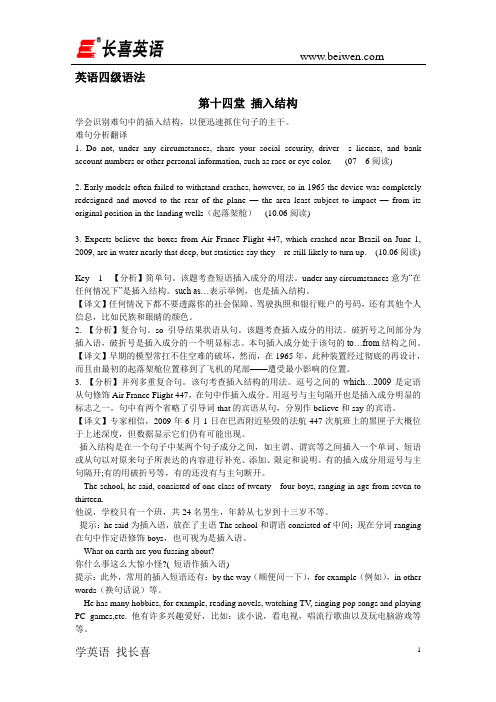
英语四级语法第十四堂插入结构学会识别难句中的插入结构,以便迅速抓住句子的主干。
难句分析翻译1. Do not, under any circumstances, share your social security, driver s license, and bank account numbers or other personal information, such as race or eye color. (07 6阅读)2. Early models often failed to withstand crashes, however, so in 1965 the device was completely redesigned and moved to the rear of the plane —the area least subject to impact —from its original position in the landing wells(起落架舱)(10.06阅读)3. Experts believe the boxes from Air France Flight 447, which crashed near Brazil on June 1, 2009, are in water nearly that deep, but statistics say they re still likely to turn up. (10.06阅读)Key 1 【分析】简单句。
该题考查短语插入成分的用法。
under any circumstances意为“在任何情况下”是插入结构。
such as…表示举例,也是插入结构。
【译文】任何情况下都不要透露你的社会保障、驾驶执照和银行账户的号码,还有其他个人信息,比如民族和眼睛的颜色。
2. 【分析】复合句。
so 引导结果状语从句。
30.插入语

插人语一、插入语的定义插人语通常与句中其他成分没有语法上的关系,多半用逗号与句子隔开,用来表示说话者对句子所表达的意思的态度。
插入语可能是一个词、一个短语或一个句子。
二、插入语的分类1.常用作插入语的副词有indeed(的确),certainly(当然),surely(无疑地),however(然而)等。
His spoken English is very good,indeed.他的英语口语的确很好。
Certainly,she won’t go with you.当然她不会和你一起走的。
Strangely,he has not been here lately. Even more strangely, he has not phoned.奇怪,他最近没有来这里。
更奇怪的是,他没有打来过电话。
2.形容词及词组作插人语True,it would be too late.真的,太晚了。
Strange to say,she hasn’t got my letter up to now.说也奇怪,她到现在还没有接到我的信。
3.常用作插入语的介词短语有in short(简言之),of course(当然),in general(一般说来),in fact(事实上),in other words(换句话说),in a word(总之),in a few word“(简言之)等。
China, in fact,is a developing country.事实上中国是一个发展中国家。
In general,men are stronger than women.一般说来,男人要比女人强壮。
In other words,be refused to accept your invitation.换句话说,他拒绝接受你的邀请。
Of course,he did not succeed because he hadn’t taken our advice.当然,他因为没有听取我们的建议而没有成功。
插入语资料.doc

插入语导入:China successfully launched its largest and most powerful carrier rocket, the Long March-5, into space after 10 years of research, _________ engineers say represents the country’s space ambition.学生问:此处为何要填which,从句中不缺主要成分啊?分析:这里从句中缺主语,engineers say 插入语。
英语句中有时会插入一个与全句句义无直接关系的附加部分,这个部分就叫插入语。
插入语通常与句中其它部分没有语法上的联系,将它删掉之后,句子结构仍然完整。
插入语的作用:表示说话人的态度;解释或说明或总结;强调;引起对方的注意;转移话题或说明事由;承上启下,使句子衔接得更紧密。
(插入语表示说话人的态度,解释或说明整个句子而非某个词。
)1.插入句子常见的有I hope, I guess, I think, I’m afraid, I believe, I suppose, I wonder, you know, I tell you, it is said, it is suggested, it seems, it seems to me, as far as I know; what’s more, that is to say等:Some animals only half-hibernate, that is to say, their sleep is not such a deep one.He can’t pass the exam because he doesn’t study hard. What’s more, he isn’t so clever.She, I think, has no feeling for your trouble.What do you think is the proper time to start?You’ll have to try harder, you know, if you want to succeed.This is the last chance, I’m afraid, that you can win over them.It began to snow, and what was worse, we lost our way in the forest.Jack, as far as I know, isn’t as honest as we expect.Future generations, it may be, will hardly believe that such a person as this walked upon this earth. (未来几代人,可能难以相信,在这个人世间曾经有这样的一个人走过。
英语四级写作得分点--插入语
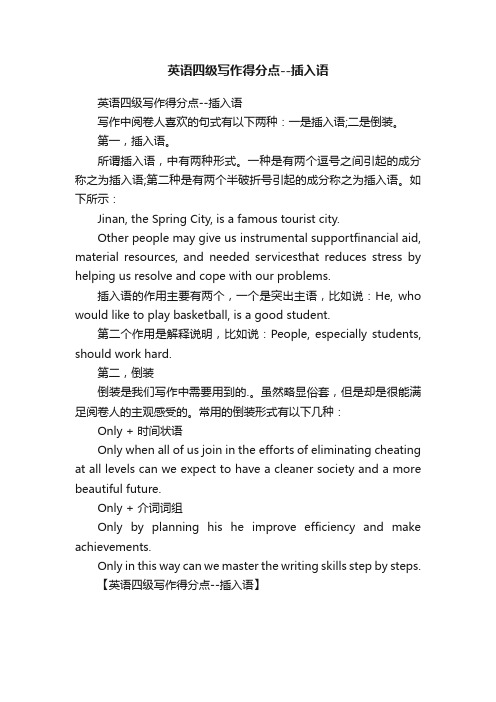
英语四级写作得分点--插入语英语四级写作得分点--插入语写作中阅卷人喜欢的句式有以下两种:一是插入语;二是倒装。
第一,插入语。
所谓插入语,中有两种形式。
一种是有两个逗号之间引起的成分称之为插入语;第二种是有两个半破折号引起的成分称之为插入语。
如下所示:Jinan, the Spring City, is a famous tourist city.Other people may give us instrumental supportfinancial aid, material resources, and needed servicesthat reduces stress by helping us resolve and cope with our problems.插入语的作用主要有两个,一个是突出主语,比如说:He, who would like to play basketball, is a good student.第二个作用是解释说明,比如说:People, especially students, should work hard.第二,倒装倒装是我们写作中需要用到的.。
虽然略显俗套,但是却是很能满足阅卷人的主观感受的。
常用的倒装形式有以下几种:Only + 时间状语Only when all of us join in the efforts of eliminating cheating at all levels can we expect to have a cleaner society and a more beautiful future.Only + 介词词组Only by planning his he improve efficiency and make achievements.Only in this way can we master the writing skills step by steps.【英语四级写作得分点--插入语】。
英语插入语用法详解

之杨若古兰创作英语中的拔出语拔出语普通对一句话作一些附加的说明.它是中学英语语法的重点,也是高考的考点.通常与句中其它部分没有语法上的联系,将它删掉以后,句子结构仍然完好.拔出语在句中有时是对一句话的一些附加解释、说明或总结;有时表达说话者的态度和看法;有时起强调的感化;有时是为了惹起对方的留意;还可以起转移话题或说明事由的感化;也能够承上启下,使句子跟尾得更紧密一些.把握这一说话景象不但有益于对英语句子等的理解,还有益于提高写作等的水平.拔出语的类型较多,罕见的如下几种:一、描述词(短语)作拔出语. 能用作拔出语的描述词(短语)罕见的有:true,wonderful,excellent,strange to say,most important of all, sure enough等. 如:True,it would be too bad. 真的,太糟了.Wonderful,we have won again. 太好了,我们又赢了. Strange to say,he hasn’t got my letter up to now. 说来也奇怪,他到此刻还没有收到我的信. Most important of all,we must learn all the skills. 最主要的是,我们必须把握所有的技巧.二、副词(短语)作拔出语. 能用作拔出语的副词(短语)有:indeed,surely,still,otherwise,certainly,however,generally,personally,honestly,fortunately,luckily,though,besides,exactly,perhaps,maybe,probably,frankly,or rather等.如:When he got to there,he found,however,that the weather was too bad. 可是到了那儿以后他发现,那儿的天气太坏了. Otherwise,he would still be at home. 否则的话,他还会在家的.三、介词短语作拔出语. 能用作拔出语的介词短语有:in fact,in one’s opinion,in general,in a word,in other words,in a few words,of course,by the way,as a result,for example,on the contrary,on the other hand,to one’s surprise,in short,as a matter of fact,in conclusion,in brief 等.如:You can’t wait anymore-in other words,you should start at once. 你不克不及再等了——换言之,你得立即出发. On the contrary,we should strengthen our corporation with them. 相反,我们应当加强和他们的合作.四、V-ing(短语)作拔出语. 能用作拔出语的V-ing(短语)罕见的有:generally speaking,strictly speaking,judging from by,talking of,considering等.如:Generally speaking,the weather there is neither too cold in winter nor too hot in summer. 普通来说,那儿的气候冬天不太冷,炎天不太热. Judging by his clothes,he may be an artist. 从穿着来判断,他可能是个艺术家.五、不定式短语作拔出语. 能用作拔出语的不定式短语有:to be frank,to be honest,to be sure,to tell you the truth,to make matters worse,to sum up,to start with,to begin with等. 如:To be frank,I don’t quite agree with you.坦率地说,我不太同意你的定见. To tell you the truth,I’m not so interested in the matter. 跟你说实话,我对这件事情的爱好不大. To sum up,success results from hard work. 总而言之,成功是艰苦努力的结果.六、句子(陈述句和普通疑问句)作拔出语. 能用作拔出语的句子有:I am sure,I believe,I think,I know,I suppose,I hope,I’m afraid,you see,what’s more,that is to say,as we know,as I see,believe it or not等. 如:Some animals only half-hibernate,that is to say,their sleep is not such a deep one. 有些动物只是半冬眠,就是说,它们的睡眠其实不是深度睡眠.I believe,China will catch up with the developed countries sooner or later. 我确信,中国迟早会赶上发达国家. He can’t pass the exam,because he doesn’t study hard. What’s more,he isn’t so clever.他不克不及通过此次考试,由于他进修不认真,更何况他又不太聪明. 拔出语的利用拔出语(句)是说话者对所表达意思的弥补、强调、解释或者说话的态度,其地位灵活,经经常使用逗号或破折号与其他成分隔开,而且在语法上不影响其他成分.例如:I think,she has no feeling for your trouble. / She,I think,has no feeling for your trouble. 我想,她对你的遭受无动于中.一. 罕见的拔出语和拔出句.1. 拔出语常以副词(副词短语)、描述词(描述词短语)、介词短语、非谓语动词短语等方式出现.(1 )罕见的副词及短语:indeed,surely,however,obviously,frankly,naturally,luckily / happily for sb. certainly 等.( 2 )罕见的描述词及短语:funny,needless to say (不必说),most important of all 等.( 3 )罕见的介词短语: by the way, in a few words / in sum / in short (简而言之), in other words, in general, in one's opinion / judgment (按照某人的定见), in fact, in the first place,of course,to one's knowledge / surprise / regret /satisfaction / mind / joy / disappointment 等.( 4 )罕见的此刻分词短语:strictly / generally / honestly / personally / exactly / physically / speaking (严酷地 / 普通地/ 坦诚地等)说;judging from / by …(根据……判断)等.( 5 )罕见的动词不定式短语: to be sure (无疑地),to sum up (概括地说), to tell the truth, to be honest, to be short,to conclude,to put it briefly,to put it in another way,to begin (start )with 等.留意:上述单词或短语作拔出语和状语时的区别.例如:( 1 )Frankly,he'd like to listen to music.(副词作拔出语,暗示说话人的态度)Here you should speak frankly.(副词作状语)(2 )True,your daughter is at home now. (描述词作拔出语)He came back,hungry and tired. (描述词作状语)( 3 ) Judging from what he said, he does look down his elder brother. (此刻分词作拔出语,其主语不是句中的主语,只是说话者的附加说明)Seeing from the window, he can see the lake. (此刻分词作状语,逻辑主语是句中的主语he )(4 )To tell you the truth,he doesn't quite agree with this idea. (不定式作拔出语,动作主体不是句中的主语,只是说话者的附加说明)To buy the machine,he went to Beijing. (不定式作目的状语,逻辑主语是句中的主语he )2. 拔出句为简短的、具有完好意义的句子.罕见的拔出句如下: I think / hope / guess / know / believe / suppose, I am sure (我可以肯定地说), that is ( to say )(也就是说),it seems (看来是), as I see it (照我看来), what's more,what's worse,what is important / serious (主要/ 严重的是),I'm afraid (恐怕),it is said (据说),as we all know (尽人皆知)等.拔出句独立性强,普通用标点符号将其与其他句子成分隔开.该当特别留意疑问句的拔出句,它普通为倒装语序且无任何标点符号,而且全部疑问句该当坚持陈述语序.例如:( 1 )What should I do first?What do you think I should do first?(被拔出的疑问句本来为倒装语序,拔出后成为陈述语序)( 2 )Who is singing?Who do you think is singing?(被拔出的疑问句本来就是陈述语序,不须要做调整)。
独立主格和插入语课件
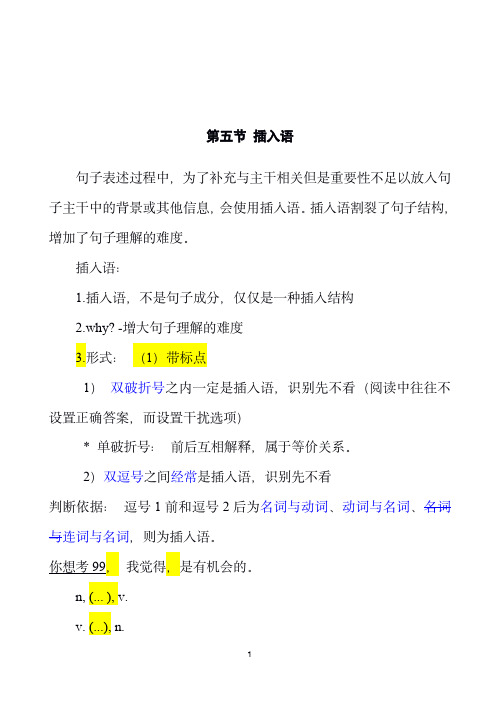
第五节插入语句子表述过程中,为了补充与主干相关但是重要性不足以放入句子主干中的背景或其他信息,会使用插入语。
插入语割裂了句子结构,增加了句子理解的难度。
插入语:1.插入语,不是句子成分,仅仅是一种插入结构2.why?-增大句子理解的难度3.形式:(1)带标点1)双破折号之内一定是插入语,识别先不看(阅读中往往不设置正确答案,而设置干扰选项)*单破折号:前后互相解释,属于等价关系。
2)双逗号之间经常是插入语,识别先不看判断依据:逗号1前和逗号2后为名词与动词、动词与名词、名词与连词与名词,则为插入语。
我觉得,是有机会的。
n,(...),v.v.(...),n.conj,(...),n.**单逗号【并列】1)adj,adj2)A,B,and C3)英语中,逗号不能连接两个句子。
写作时要注意。
(2)不带标点的:1)短语(状语)of course;in large part大部分2)关系词(从句中充当主语)+插入语+谓语动词一、有标点符号隔开的插入语插入语通常用逗号或者破折号与主句隔开。
(1)A deal is a deal—except(prep.除了),apparently,when Entergy is involved.n vv nconj ndeal n.交易v.处理deal with处理;deal with adult(处理和成年人之间的事情----和成年人打交道)when从句?when充当什么成分?介词+宾语(句子)/宾从when?A fall into the pit,a gain in your wit.pit n.坑,剧场后座wit n.智慧吃一堑长一智。
(2)At Time Warner,however,such questions are simply the latest manifestation of the soul-searching that has involved the company ever since the company was born in1990.(3)While(conj.)few craftsmen*(工匠,手工艺者)or farmers【n】, let alone dependents and servants,left(leave v)literary compositions(文学作品)(to be analyzed后定+被动),it is obvious that【their views wereless fullyintellect n.智力,才智intellectual n.知识分子;adj.智力的,才智的intellectualize v.使有智力/有理智intellectualized(done);有理智的,有智力的,有知识的识别插入,找出句子主句虽然很少有手工艺者或农场主,留下可供分析的文学作品识别插入语,见到就是:let alone(更不用说),combined with/along with/together with/ coupled with/in conjunction with/alongside连同/和看起来洋气,但是不会做为阅读正确答案。
插入语讲义
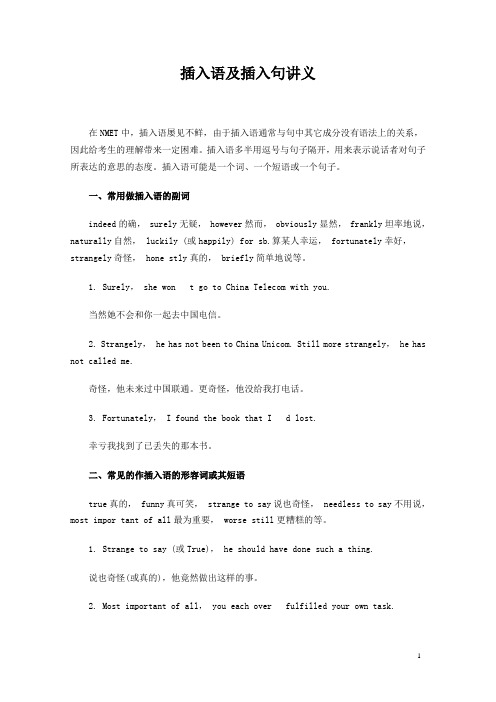
插入语及插入句讲义在NMET中,插入语屡见不鲜,由于插入语通常与句中其它成分没有语法上的关系,因此给考生的理解带来一定困难。
插入语多半用逗号与句子隔开,用来表示说话者对句子所表达的意思的态度。
插入语可能是一个词、一个短语或一个句子。
一、常用做插入语的副词indeed的确, surely无疑, however然而, obviously显然, frankly坦率地说,naturally自然, luckily (或happily) for sb.算某人幸运, fortunately幸好,strangely奇怪, hone stly真的, briefly简单地说等。
1. Surely, she won t go to China Telecom with you.当然她不会和你一起去中国电信。
2. Strangely, he has not been to China Unicom. Still more strangely, he has not called me.奇怪,他未来过中国联通。
更奇怪,他没给我打电话。
3. Fortunately, I found the book that I d lost.幸亏我找到了已丢失的那本书。
二、常见的作插入语的形容词或其短语true真的, funny真可笑, strange to say说也奇怪, needless to say不用说,most impor tant of all最为重要, worse still更糟糕的等。
1. Strange to say (或True), he should have done such a thing.说也奇怪(或真的),他竟然做出这样的事。
2. Most important of all, you each over fulfilled your own task.更为重要的,你们各自超额完成了自己的任务。
三、常用作插入语的介词短语in a few words(或in sum, in short)简而言之, in other words换句话说, in a sense在某种意义上, in general一般说来, in my view在我看来, in hisopinion(judgment)按照他的意见(判断), in conclusion总之, in summary概括地说, in fact事实上, in the first place首先, in addition此外, of course 当然, to our knowledge据我们所知, to my joy(delight, satisfaction)使我欣慰(高兴、满意)的, to their surprise(astonis hment, amazement)使他们惊奇的, to her regret (disappointment)使她遗憾(失望)的, for instance(或example)例如, as a matter of fact事实上等。
插入语用法归纳

插入语在日常交际用语和书面表达中,插入语频频出现。
英语中的插入语(Parenthesis)是插在句子中的一个词,短语或从句,通常被逗号、破折号或句子的其他部分隔开,它与句子的其他部分之间没有语法上的关系,因此,有的语法学家将其归为独立成分。
插入语在句中通常是对一句话的一些附加解释,说明或总结;有时表示说话者的态度和看法;有时起强调的作用;有时是为了引起对方的注意;还可以起转移话题或说明事由的作用;也可以承上启下,使句子与前面的语句衔接的更紧密一些。
插入语大致可分为以下10种类型:1. 形容词或形容词短语作插入语如:worst still, sure enough, strange, most important of all等。
Strange, there is nobody in the classroom. 很奇怪,教室里没人。
2. 副词或副词短语作插入语如:personally, honestly, fortunately, luckily, for us, though, besides, exactly, surely, frankly, still otherwise 等。
Luckily for you, I happen to have the key.你很运气,我正好带了钥匙。
3. 介词短语作插入语如:of course, in short, as a matter of fact, by the way, on the other hand, in my opinion, in conclusion等。
In short, we should not stop halfway.简言之,我们不能半途而废。
As a result, they suffered heavy losses.结果,他们受到了严重损失。
On the contrary, we should strengthen our ties with them.相反,我们还应加强和他们的联系。
英语插入语用法详解之欧阳文创编
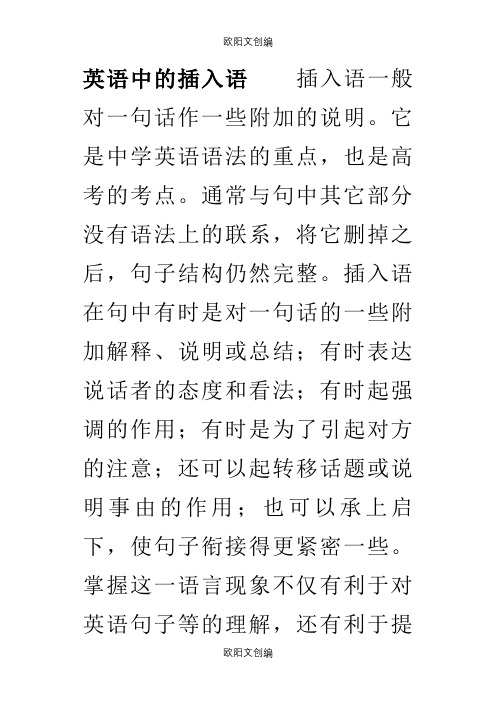
英语中的插入语插入语一般对一句话作一些附加的说明。
它是中学英语语法的重点,也是高考的考点。
通常与句中其它部分没有语法上的联系,将它删掉之后,句子结构仍然完整。
插入语在句中有时是对一句话的一些附加解释、说明或总结;有时表达说话者的态度和看法;有时起强调的作用;有时是为了引起对方的注意;还可以起转移话题或说明事由的作用;也可以承上启下,使句子衔接得更紧密一些。
掌握这一语言现象不仅有利于对英语句子等的理解,还有利于提高写作等的水平。
插入语的类型较多,常见的如下几种:一、形容词(短语)作插入语。
能用作插入语的形容词(短语)常见的有:true,wonderful,excellent,strange to say,most important of all,sure enough等。
如:True,it would be too bad. 真的,太糟了。
Wonderful,we have won again.太好了,我们又赢了。
Strange to say,he hasn’t got my letter up to now. 说来也奇怪,他到现在还没有收到我的信。
Most important of all,we must learn all the skills. 最重要的是,我们必须掌握所有的技巧。
二、副词(短语)作插入语。
能用作插入语的副词(短语)有:indeed,surely,still,otherwise,certainly,however,generally,personally,honestly,fortunately,luckily,though,besides,exactly,perhaps,maybe,probably,frankly,or rather等。
如:When he got to there,he found,however,that the weather was too bad. 可是到了那儿之后他发现,那儿的天气太坏了。
(完整)英语插入语用法大全,推荐文档.docx
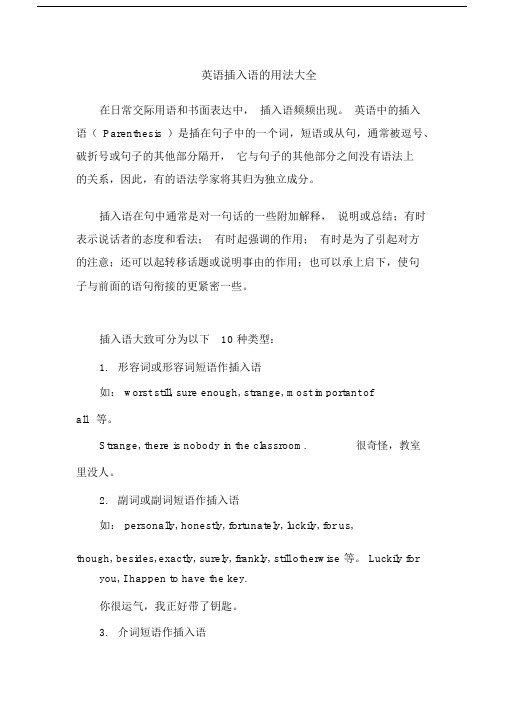
英语插入语的用法大全在日常交际用语和书面表达中,插入语频频出现。
英语中的插入语(Parenthesis )是插在句子中的一个词,短语或从句,通常被逗号、破折号或句子的其他部分隔开,它与句子的其他部分之间没有语法上的关系,因此,有的语法学家将其归为独立成分。
插入语在句中通常是对一句话的一些附加解释,说明或总结;有时表示说话者的态度和看法;有时起强调的作用;有时是为了引起对方的注意;还可以起转移话题或说明事由的作用;也可以承上启下,使句子与前面的语句衔接的更紧密一些。
插入语大致可分为以下10 种类型:1.形容词或形容词短语作插入语如: worst still, sure enough, strange, most important ofall等。
Strange, there is nobody in the classroom.很奇怪,教室里没人。
2.副词或副词短语作插入语如: personally, honestly, fortunately, luckily, for us,though, besides,exactly, surely, frankly, still otherwise 等。
Luckily for you, I happen to have the key.你很运气,我正好带了钥匙。
3.介词短语作插入语如: of course, in short, as a matter of fact, by the way,on the other hand, in my opinion, in conclusion等。
In short, we should not stop halfway.言之,我不能半途而。
As a result, they suffered heavy losses.果,他受到了重失。
On the contrary, we should strengthen our ties with them.相反,我加和他的系。
英语插入语用法详解
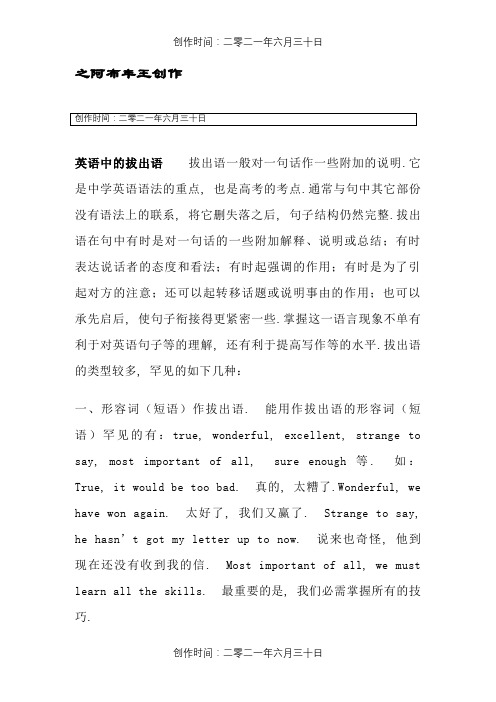
之阿布丰王创作英语中的拔出语拔出语一般对一句话作一些附加的说明.它是中学英语语法的重点, 也是高考的考点.通常与句中其它部份没有语法上的联系, 将它删失落之后, 句子结构仍然完整.拔出语在句中有时是对一句话的一些附加解释、说明或总结;有时表达说话者的态度和看法;有时起强调的作用;有时是为了引起对方的注意;还可以起转移话题或说明事由的作用;也可以承先启后, 使句子衔接得更紧密一些.掌握这一语言现象不单有利于对英语句子等的理解, 还有利于提高写作等的水平.拔出语的类型较多, 罕见的如下几种:一、形容词(短语)作拔出语. 能用作拔出语的形容词(短语)罕见的有:true, wonderful, excellent, strange to say, most important of all, sure enough等.如:True, it would be too bad. 真的, 太糟了.Wonderful, we have won again. 太好了, 我们又赢了. Strange to say, he hasn’t got my letter up to now. 说来也奇怪, 他到现在还没有收到我的信. Most important of all, we must learn all the skills. 最重要的是, 我们必需掌握所有的技巧.二、副词(短语)作拔出语. 能用作拔出语的副词(短语)有:indeed, surely, still, otherwise, certainly, however, generally, personally, honestly, fortunately, luckily, though, besides, exactly, perhaps, maybe, probably, frankly, or rather等. 如:When he got to there, he found, however, that the weather was too bad. 可是到了那儿之后他发现, 那儿的天气太坏了. Otherwise, he would still be at home. 否则的话, 他还会在家的.三、介词短语作拔出语.能用作拔出语的介词短语有:in fact, in one’s opinion, in general, in a word, in other words, in a few words, of course, by the way, as a result, for example, on the contrary, on the other hand, to one’s surprise, in short, as a matter of fact, in conclusion, in brief等.如:You can’t wait anymore-in other words, you should start at once. 你不能再等了——换言之, 你得立即动身. On the contrary, we should strengthen our corporation with them. 相反, 我们应该加强和他们的合作.四、V-ing(短语)作拔出语. 能用作拔出语的V-ing(短语)罕见的有:generally speaking, strictly speaking, judging from by, talking of, considering等.如:Generally speaking, the weather there is neither too cold in winter nor too hot in summer.一般来说, 那儿的气候冬季不太冷, 夏天不太热. Judging by his clothes, he may be an artist. 从衣着来判断, 他可能是个艺术家. 五、不定式短语作拔出语. 能用作拔出语的不定式短语有:to be frank, to be honest, to be sure, to tell you the truth, to make matters worse, to sum up, to start with, to begin with等.如:To be frank, I don’t quite agree with you. 坦率地说, 我不太同意你的意见. To tell you the truth, I’m not so interested in the matter.跟你说实话, 我对这件事情的兴趣不年夜.To sum up, success results from hard work. 总而言之, 胜利是艰苦努力的结果.六、句子(陈说句和一般疑问句)作拔出语. 能用作拔出语的句子有:I am sure, I believe, I think, I know, I suppose, I hope, I’m afraid, you see, what’s more, that is to say, as we know, as I see, believe it or not等. 如:Some animals only half-hibernate, that is to say, their sleep is not such a deep one. 有些植物只是半蛰伏, 就是说, 它们的睡眠其实不是深度睡眠. I believe, China will catch up with the developedcountries sooner or later. 我确信, 中国早晚会赶上发达国家.He can’t pass the exam, because he doesn’t study hard. What’s more, he isn’t so cle ver. 他不能通过这次考试, 因为他学习不认真, 更何况他又不太聪慧. 拔出语的应用拔出语(句)是说话者对所表达意思的弥补、强调、解释或者说话的态度, 其位置灵活, 经经常使用逗号或破折号与其他成份隔开, 而且在语法上不影响其他成份.例如:I think, she has no feeling for your trouble. / She, I think, has no feeling for your trouble. 我想, 她对你的遭遇无动于衷.一. 罕见的拔出语和拔出句.1. 拔出语常以副词(副词短语)、形容词(形容词短语)、介词短语、非谓语动词短语等形式呈现.( 1 )罕见的副词及短语: indeed, surely, however, obviously, frankly, naturally, luckily / happily for sb. certainly 等.( 2 )罕见的形容词及短语: funny, needless to say (不用说), most important of all 等.( 3 )罕见的介词短语:by the way, in a few words / in sum / in short (简而言之), in other words, in general, in one's opinion / judgment (依照某人的意见), in fact, in the first place, of course, to one's knowledge / surprise / regret /satisfaction / mind / joy / disappointment 等.( 4 )罕见的现在分词短语: strictly / generally / honestly / personally / exactly / physically / speaking (严格地/ 一般地/ 坦诚地等)说;judging from / by …(根据……判断)等.( 5 )罕见的动词不定式短语: to be sure (无疑地), to sum up (概括地说), to tell the truth, to be honest, to be short, to conclude, to put it briefly, to put it in another way, to begin ( start ) with 等.注意:上述单词或短语作拔出语和状语时的区别.例如:( 1 )Frankly, he'd like to listen to music.(副词作拔出语, 暗示说话人的态度)Here you should speak frankly.(副词作状语)( 2 ) True, your daughter is at home now. (形容词作拔出语)He came back, hungry and tired. (形容词作状语)( 3 )Judging from what he said, he does look down his elder brother. (现在分词作拔出语, 其主语不是句中的主语, 只是说话者的附加说明)Seeing from the window, he can see the lake. (现在分词作状语, 逻辑主语是句中的主语he )( 4 )To tell you the truth, he doesn't quite agree with this idea. (不定式作拔出语, 举措主体不是句中的主语, 只是说话者的附加说明)To buy the machine, he went to Beijing. (不定式作目的状语, 逻辑主语是句中的主语he )2. 拔出句为简短的、具有完整意义的句子.罕见的拔出句如下:I think / hope / guess / know / believe / suppose, I am sure (我可以肯定地说), that is ( to say )(也就是说), it seems (看来是), as I see it (照我看来), what's more, what's worse, what is important / serious (重要 / 严重的是), I'm afraid (恐怕) , it is said (据说), as we all know (众所周知)等.拔出句自力性强, 一般用标点符号将其与其他句子成份隔开.应当特别注意疑问句的拔出句, 它一般为倒装语序且无任何标点符号, 而且整个疑问句应当坚持陈说语序.例如:( 1 )What should I do first?What do you think I should do first?(被拔出的疑问句原来为倒装语序, 拔出后成为陈说语序)( 2 )Who is singing?Who do you think is singing?(被拔出的疑问句原来就是陈说语序, 不需要做调整)。
四级高级语法讲义:插入语
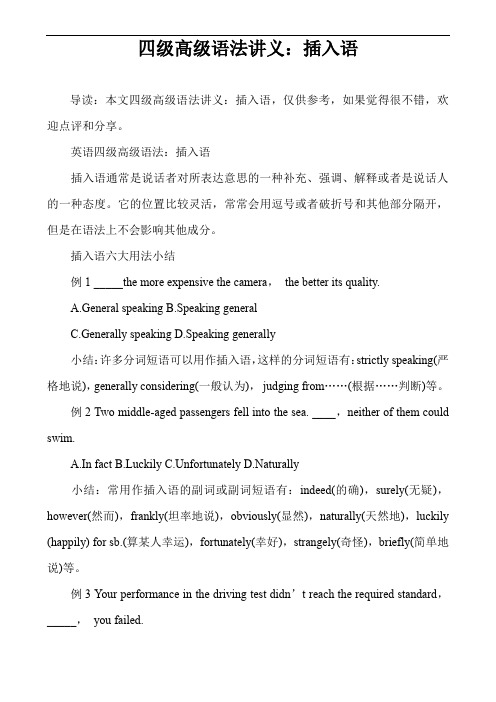
四级高级语法讲义:插入语导读:本文四级高级语法讲义:插入语,仅供参考,如果觉得很不错,欢迎点评和分享。
英语四级高级语法:插入语插入语通常是说话者对所表达意思的一种补充、强调、解释或者是说话人的一种态度。
它的位置比较灵活,常常会用逗号或者破折号和其他部分隔开,但是在语法上不会影响其他成分。
插入语六大用法小结例1 _____the more expensive the camera,the better its quality.A.General speakingB.Speaking generalC.Generally speakingD.Speaking generally小结:许多分词短语可以用作插入语,这样的分词短语有:strictly speaking(严格地说),generally considering(一般认为),judging from……(根据……判断)等。
例2 Two middle-aged passengers fell into the sea. ____,neither of them could swim.A.In factB.LuckilyC.UnfortunatelyD.Naturally小结:常用作插入语的副词或副词短语有:indeed(的确),surely(无疑),however(然而),frankly(坦率地说),obviously(显然),naturally(天然地),luckily (happily) for sb.(算某人幸运),fortunately(幸好),strangely(奇怪),briefly(简单地说)等。
例3 Your performance in the driving test didn’t reach the required standard,_____,you failed.A.in the endB.after allC.in other wordsD.at the same time小结:常用作插入语的介词短语有:in conclusion(总之),in a word(简而言之),in short(简而言之),in general(一般说来),in a sense(在某种意义上),in my view(在我看来),in his opinion(按照他的看法),in fact(事实上),at first(首先),in addition(此外),of course(当然),to my surprise(使我惊奇的),to her regret(使她遗憾的),for example(例如)等。
英语语法之插入语完美课件

Why do you suppose the accident has happened? 你认为事故为什么会发生?
How many books do you guess he bought the other day? 你猜他那天买了几本书?
7.疑问短句作插入语:do you think, do you suppose, do you guess,do you expect,do you believe等。其 句型为“疑问词+ do you think等+主语+动词?”
Who do you think you're talkinn use the dressing room there to try it on, if you like.
如果您愿意的话,可以去那儿的试衣室试穿一下。
I could come earlier, if necessary. 如果必要我可以早点来。
3.介词短语作插入语:in a word, in a few words,in all,in totall, in short, in other words, in a sense, in general, in fact, in addition, in one's opinion, as a matter of fact, as a result,as a consequence, of course, for example, by the way, above all, on the other hand, on the contrary, to one's joy, to one's surprise等。
英语常用插入语详解

插插入入语语插入语[parenthesis]在一个句子中间插入一个成分,它不作句子的何种成分,也不和句子的何种成分发生结构关系,同时既不起连接作用,也不表示语气,这个成分称之插入语。
如“这堆砂土,充其量有十辆卡车就运去了”“我家后面有一个很大的园子,相传叫做百草园”中的“充其量”和“相传”即是插入语英语中的插入语插入语一般对一句话作一些附加的说明。
它是中学英语语法的重点,也是高考的考点。
通常与句中其它部分没有语法上的联系,将它删掉之后,句子结构仍然完整。
插入语在句中有时是对一句话的一些附加解释、说明或总结;有时表达说话者的态度和看法;有时起强调的作用;有时是为了引起对方的注意;还可以起转移话题或说明事由的作用;也可以承上启下,使句子衔接得更紧密一些。
掌握这一语言现象不仅有利于对英语句子等的理解,还有利于提高写作等的水平。
插入语的类型较多,常见的如下几种:一、形容词(短语)作插入语。
能用作插入语的形容词(短语)常见的有:true,wonderful,excellent,strange to say,most important of all,sure enough等。
如:True,it would be too bad.真的,太糟了。
Wonderful,we have won again.太好了,我们又赢了。
Strange to say,he hasn?t got my letter up to now.说来也奇怪,他到现在还没有收到我的信。
Most important of all,we must learn all the skills.最重要的是,我们必须掌握所有的技巧。
二、副词(短语)作插入语。
能用作插入语的副词(短语)有:indeed,surely,still,otherwise,certainly,however,generally,personally,honestly,fortunately,luckily,though,besides,exactly,perhaps,maybe,probably,frankly,or rather等。
16《插入语》
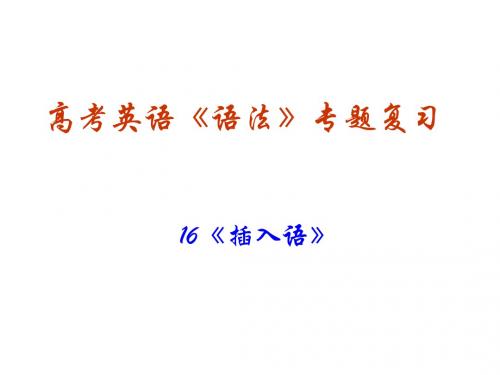
1. Of course, he did not succeed for the , lack of experience. 当然,他由于缺乏经验而未成功。 当然,他由于缺乏经验而未成功。 2. She knows much more about computer science than the other students do, for in stance. , 例如, 例如,她在计算机科学方面就比其他 同学懂得多。 同学懂得多。
• 4.常见的介词短语有 常见的介词短语有:in fact; in addition; in a 常见的介词短语有 word; on the other hand; in other words; in one's opinion; in that case; by the way; of course; as a rule(通常 通常);to one's surprise; for 通常 example; on the contrary(相反 相反);in a way(在某点 相反 在某点 在某种程度上); 上、在某种程度上 for one thing; for another (thing)等。例如 等 例如: In a way, I think we both won in the game.
• 巩固练习:请选出最佳答案。 巩固练习 请选出最佳答案。 请选出最佳答案 • 1. It is always difficult being in a foreign country, ________if you don't speak the language. (NMET2000) • A. extremely B. naturally • C. basically D. especially 2. ________be sent to work there? (上海 上海2002) 上海 A. Who do you suggest • B. Who do you suggest that should C. Do you suggest who should • D. Do you suggest whom should 3. Two middle-aged passengers fell into the sea ,________, neither of them could swim. • A.in fact B.luckily C.unfortunately D.naturally 4. Never waste anything, and________, never waste time. A. after all B. at all C. in all D. above all
插入语1
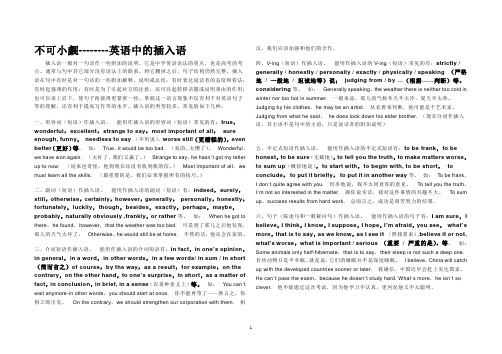
不可小觑--------英语中的插入语插入语一般对一句话作一些附加的说明。
它是中学英语语法的重点,也是高考的考点。
通常与句中其它部分没有语法上的联系,将它删掉之后,句子结构仍然完整。
插入语在句中有时是对一句话的一些附加解释、说明或总结;有时表达说话者的态度和看法;有时起强调的作用;有时是为了引起对方的注意;还可以起转移话题或说明事由的作用;也可以承上启下,使句子衔接得更紧密一些。
掌握这一语言现象不仅有利于对英语句子等的理解,还有利于提高写作等的水平。
插入语的类型较多,常见的如下几种:一、形容词(短语)作插入语。
能用作插入语的形容词(短语)常见的有:true,wonderful,excellent,strange to say,most important of all,sure enough, funny,needless to say(不用说),worse still(更糟糕的),even better(更好)等。
如:True,it would be too bad.(真的,太糟了)。
Wonderful,we have won again.(太好了,我们又赢了。
)Strange to say,he hasn’t got my letter up to now.(说来也奇怪,他到现在还没有收到我的信。
)Most important of all,we must learn all the skills.(最重要的是,我们必须掌握所有的技巧。
)二、副词(短语)作插入语。
能用作插入语的副词(短语)有:indeed,surely,still,otherwise,certainly,however,generally,personally,honestly,fortunately,luckily,though,besides,exactly,perhaps,maybe,probably,naturally obviously ,frankly,or rather等。
- 1、下载文档前请自行甄别文档内容的完整性,平台不提供额外的编辑、内容补充、找答案等附加服务。
- 2、"仅部分预览"的文档,不可在线预览部分如存在完整性等问题,可反馈申请退款(可完整预览的文档不适用该条件!)。
- 3、如文档侵犯您的权益,请联系客服反馈,我们会尽快为您处理(人工客服工作时间:9:00-18:30)。
2016英语四级语法讲义:插入语
2016英语四级语法讲义:插入语
插入语通常是说话者对所表达意思的一种补充、强调、解释或者是说话人的一种态度。
它的位置比较灵活,常常会用逗号或者破折号和其他部分隔开,但是在语法上不会影响其他成分。
插入语六大用法小结
例1 _____the more expensive the camera, the better its quality.
A.General speaking
B.Speaking general
C.Generally speaking
D.Speaking generally
小结:许多分词短语可以用作插入语,这样的分词短语有:strictly speaking(严格地说),generally considering(一般认为), judging from……(根据……判断)等。
例2 Two middle-aged passengers fell into the sea. ____,neither of them could swim.
A.In fact
B.Luckily
C.Unfortunately
D.Naturally
小结:常用作插入语的副词或副词短语有:indeed(的确),surely(无疑),however(然而),frankly(坦率地说),obviously(显然),naturally(天然地),luckily (happily) for sb.(算某人幸运),fortunately(幸好),strangely(奇怪),briefly(简单地说)等。
例3 Your performance in the driving test didn’t reach the required standard,_____, you failed.
A.in the end
B.after all
C.in other words
D.at the same time
小结:常用作插入语的介词短语有:in conclusion(总之),in a word(简而言之),in short(简而言之),in general(一般说来),in a sense(在某种意义上),in my view(在我看来),in his opinion(按照他的看法),in fact(事实上),at first(首先), in addition(此外),of course(当然),to my surprise(使我惊奇的),to her regret(使她遗憾的),for example(例如)等。
例4 It is so nice to hear from her._____,we last met more than thirty years ago.
A.What‘s more
B.That is to say
C.In other words
D.Believe it or not
小结:用简短的句子结构作插入语,它们常置于句中或句末。
这类简短的句子有:I am sure(我可以肯定地说),I believe(我相信),do you know(你知道吗),you see(你明白),I’m afraid(恐怕),it is said(据说),I suppose(我想),what’s more(而且),what’s worse(更糟糕的是),that is(也就是说),what is important(重要的是)等。
例5 _____ with you,I have no money to spare.
A.To be frank
B.What’s more
C.In addition
D.However
小结:常用作插入语的不定式短语有:to be sure(无疑地),to sum up(概括地说),to tell the truth(老实说)等。
例6 _____, he should have done such a thing.
A.Speaking general
B.Strange to say
C.Luckily
D.Of course
小结:常用作插入语的形容词或其短语有:true(真的),funny(真可笑),needless to say(不用说),most important of all(最为重要),worse still(更糟糕的),even better(更好)等。
Bill Gates, the billionaire Microsoft chairman without a single earned university degree, is by his success raising new doubts about the worth of the business world’s favorite academic title: the MBA (Master of Business Administration).
The problem, most participants in the debate acknowledge, is that the MBA has acquired an aura (光环) of future riches and power far beyond its actual importance and usefulness.
Opinion surveys in the world’s two largest economies—Japan and the United States —show consumerist definitions of success becoming ever more prevalent.
* 作文预测:CET4作文预测
* 作文模板:CET4万能模板
* CET4考试:CET4考试时间
* 成绩查询:CET4成绩查询
* CET4真题:CET4考试真题
* CET4答案:CET4考试答案
点击免费试听>>>
点击免费试听>>>
备注说明,非正文,实际使用可删除如下部分。
本内容仅给予阅读编辑指点:
1、本文件由微软OFFICE办公软件编辑而成,同时支持WPS。
2、文件可重新编辑整理。
3、建议结合本公司和个人的实际情况进行修正编辑。
4、因编辑原因,部分文件文字有些微错误的,请自行修正,并不影响本文阅读。
Note: it is not the text. The following parts can be deleted for actual use. This content only gives reading and editing instructions:
1. This document is edited by Microsoft office office software and supports WPS.
2. The files can be edited and reorganized.
3. It is suggested to revise and edit according to the actual situation of the company and individuals.
4. Due to editing reasons, some minor errors in the text of some documents should be corrected by yourself, which does not affect the reading of this article.。
